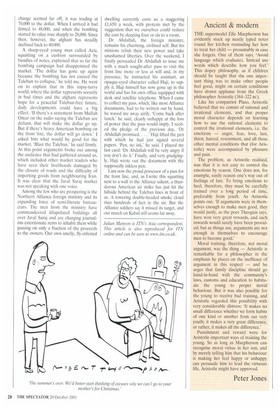Ancient & modern
THE supermodel Elle Macpherson has evidently stuck up neatly typed notes round her kitchen reminding her how to treat her child — presumably in case she forgets. One of them says, 'Avoid language which evaluates. Instead use words which describe how you feel.' This dopey philosophy, as if children should be taught that the one important thing was to make other people feel good, might on certain conditions have drawn applause from the Greek philosopher Aristotle (384-322 Bc).
Like his compatriot Plato, Aristotle believed that we consist of rational and irrational elements, and that proper moral character depends on learning how to use the rational elements to control the irrational elements, i.e. the emotions — anger, fear, love, lust, thirst, hatred, resentment, and all those other mental conditions that (for Aristotle) were accompanied by pleasure and pain.
The problem, as Aristotle realised, was that it is not easy to control the emotions by reason. One does not, for example, easily reason one's way out of feelings of lust. To bring emotions to heel, therefore, they must be carefully trained over a long period of time, preferably from youth. As Aristotle points out, 'If arguments were in themselves enough to make men good, they would justly, as the poet Theognis says, have won very great rewards, and such rewards would surely have been provided; but as things are, arguments are not enough in themselves to encourage men to become good.'
Moral training, therefore, not moral argument, was the thing — Aristotle is remarkable for a philosopher in the emphasis he places on the inefficacy of argument in this respect — and he urges that family discipline should go hand-in-hand with the community's laws, customs and education to habituate the young to proper moral behaviour. But it was also possible for the young to receive bad training, and Aristotle regarded this possibility with very considerable distress: 'It makes no small difference whether we form habits of one kind or another from our very youth; it makes a very great difference, or rather, it makes all the difference.'
Punishment and reward were for Aristotle important ways of training the young. So as long as Macpherson can recognise moral virtue in her son, and by merely telling him that his behaviour is making her feel happy or unhappy can persuade him to lead the virtuous life, Aristotle might have approved.
Peter Jones


























































































 Previous page
Previous page